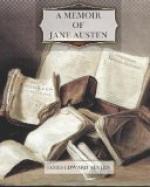It was not, however, quite impossible for a foreigner to appreciate these works; for Mons. Guizot writes thus: ’I am a great novel reader, but I seldom read German or French novels. The characters are too artificial. My delight is to read English novels, particularly those written by women. “C’est toute une ecole de morale.” Miss Austen, Miss Ferrier, &c., form a school which in the excellence and profusion of its productions resembles the cloud of dramatic poets of the great Athenian age.’
In the ‘Keepsake’ of 1825 the following lines appeared, written by Lord Morpeth, afterwards seventh Earl of Carlisle, and Lord-Lieutenant of Ireland, accompanying an illustration of a lady reading a novel.
Beats thy quick pulse o’er
Inchbald’s thrilling leaf,
Brunton’s high moral, Opie’s
deep wrought grief?
Has the mild chaperon claimed thy
yielding heart,
Carroll’s dark page, Trevelyan’s
gentle art?
Or is it thou, all perfect Austen?
Here
Let one poor wreath adorn thy early
bier,
That scarce allowed thy modest youth
to claim
Its living portion of thy certain
fame!
Oh! Mrs. Bennet! Mrs.
Norris too!
While memory survives we’ll
dream of you.
And Mr. Woodhouse, whose abstemious
lip
Must thin, but not too thin, his
gruel sip.
Miss Bates, our idol, though the
village bore;
And Mrs. Elton, ardent to explore.
While the clear style flows on without
pretence,
With unstained purity, and unmatched
sense:
Or, if a sister e’er approached
the throne,
She called the rich ‘inheritance’
her own.
The admiration felt by Lord Macaulay would probably have taken a very practical form, if his life had been prolonged. I have the authority of his sister, Lady Trevelyan, for stating that he had intended to undertake the task upon which I have ventured. He purposed to write a memoir of Miss Austen, with criticisms on her works, to prefix it to a new edition of her novels, and from the proceeds of the sale to erect a monument to her memory in Winchester Cathedral. Oh! that such an idea had been realised! That portion of the plan in which Lord Macaulay’s success would have been most certain might have been almost sufficient for his object. A memoir written by him would have been a monument.
I am kindly permitted by Sir Henry Holland to give the following quotation from his printed but unpublished recollections of his past life:—
’I have the picture still before me of Lord Holland lying on his bed, when attacked with gout, his admirable sister, Miss Fox, beside him reading aloud, as she always did on these occasions, some one of Miss Austen’s novels, of which he was never wearied. I well recollect the time when these charming novels, almost unique in their style of humour, burst suddenly on the world. It was sad that their writer did not live to witness the growth of her fame.’
My brother-in-law, Sir Denis Le Marchant, has supplied me with the following anecdotes from his own recollections:—




